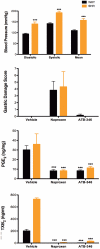Gastrointestinal-sparing effects of novel NSAIDs in rats with compromised mucosal defence
- PMID: 22496907
- PMCID: PMC3322164
- DOI: 10.1371/journal.pone.0035196
Gastrointestinal-sparing effects of novel NSAIDs in rats with compromised mucosal defence
Abstract
Nonsteroidal anti-inflammatory drugs are among the most commonly used prescription and over-the-counter medications, but they often produce significant gastrointestinal ulceration and bleeding, particularly in elderly patients and patients with certain co-morbidities. Novel anti-inflammatory drugs are seldom tested in animal models that mimic the high risk human users, leading to an underestimate of the true toxicity of the drugs. In the present study we examined the effects of two novel NSAIDs and two commonly used NSAIDs in models in which mucosal defence was expected to be impaired. Naproxen, celecoxib, ATB-346 (a hydrogen sulfide- and naproxen-releasing compound) and NCX 429 (a nitric oxide- and naproxen-releasing compound) were evaluated in healthy, arthritic, obese, and hypertensive rats and in rats of advanced age (19 months) and rats co-administered low-dose aspirin and/or omeprazole. In all models except hypertension, greater gastric and/or intestinal damage was observed when naproxen was administered in these models than in healthy rats. Celecoxib-induced damage was significantly increased when co-administered with low-dose aspirin and/or omeprazole. In contrast, ATB-346 and NCX 429, when tested at doses that were as effective as naproxen and celecoxib in reducing inflammation and inhibiting cyclooxygenase activity, did not produce significant gastric or intestinal damage in any of the models. These results demonstrate that animal models of human co-morbidities display the same increased susceptibility to NSAID-induced gastrointestinal damage as observed in humans. Moreover, two novel NSAIDs that release mediators of mucosal defence (hydrogen sulfide and nitric oxide) do not induce significant gastrointestinal damage in these models of impaired mucosal defence.
Conflict of interest statement
Figures






References
-
- Wallace JL. Prostaglandins, NSAIDs, and gastric mucosal protection: why doesn't the stomach digest itself? Physiol Rev. 2008;88:1547–1565. - PubMed
-
- Bjarnason I, Hayllar J, MacPherson AJ, Russell AS. Side effects of nonsteroidal anti-inflammatory drugs on the small and large intestine in humans. Gastroenterology. 1993;104:1832–1847. - PubMed
-
- Scheiman JM, Yeomans ND, Talley NJ, Vakil N, Chan FK, et al. Prevention of ulcers by esomeprazole in at-risk patients using non-selective NSAIDs and COX-2 inhibitors. Am J Gastroenterol 101, 2006;701–710 - PubMed
-
- Wallace JL, Syer S, Denou E, de Palma G, Vong L, et al. Proton pump inhibitors exacerbate NSAID-induced small intestinal injury by inducing dysbiosis. Gastroenterology. 2011;141:1314–1322. - PubMed
Publication types
MeSH terms
Substances
Grants and funding
LinkOut - more resources
Full Text Sources

